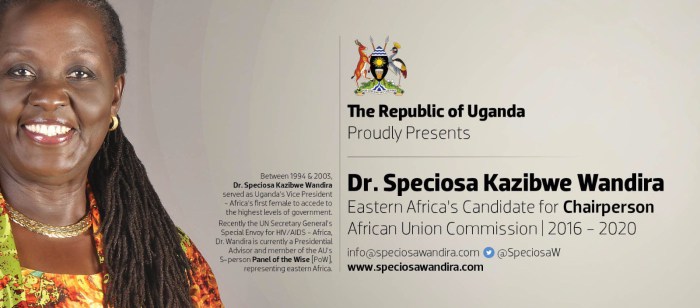Uganda’s Specioza Wandira Kazibwe might be the front-runner for the African Union Commission (AUC) chairperson job. She is one of three contenders for the position; the other two are Agapito Mokuy Mba from Equatorial Guinea and Pelonomi Venson-Moitoi from Botswana.
The main role of the AUC chair was decided five years ago. The chair is to realise Africa’s Agenda 2063, mobilise finances, and oversee peace and security on the continent. The criterion for selection is based on level of education, experience, leadership, achievement, vision and strategy. But perhaps even more than what AU cites as criteria is the country of origin of the candidate. Equatorial Guinea might get some Francophone Africa support but support for Uganda is likely to outweigh all that, even with the $10m and two jets they’ve reportedly thrown at their candidate. Botswana is unpopular in the African Union for not voting with everyone else on ICC so their candidate Venson-Moitoi stands little chance. That leaves our very own, Specioza Wandira Kazibwe.
She has in the last few months run an intense campaign to replace Dlamini Zuma as AUC Chair. She likely has support from the entire East Africa bloc and countries like Nigeria and the Gambia have thrown their names in the hat too. The main theme of her campaign is Pan-Africanism and she has continuously reiterated that Africans can move their continent with little interference from outside.
The AU summit where the decision might be taken has already started in Kigali. If this decision is not concluded at this AU gathering which ends on 18th July, it will be postponed to January meeting in Addis Ababa. But if she is able to get majority vote, then we will know within a few days who will replace Dlamini-Zuma. It is hard to be excited when the vote is so close, when very soon the headlines might run with “Uganda’s former VP now AUC chair”.
Kazibwe’s story would be a good autobiography to buy and read to young girls in Uganda. It would tell of a girl who made it to the top. She got to be the country’s Vice President when women were not considered for such positions in other countries. A woman who contributed great lines to articles about women participation in the political arena. She is a medical doctor, with a PhD from Harvard School of Public Health. Kazibwe has headed organisations and gone places. She has served as a Minister in the Uganda cabinet and as UN Special Envoy on HIV/AIDS. Kazibwe has also served for the past two years as a member of the Panel of the Wise of the African Union. It would be an empowering story.
While at the top, she advocated for male circumcision, spoke about multiple wives and told women to get martial arts skills for self-defence. And one of the bravest- and likely most difficult- decision she made, to divorce her husband due to domestic violence happened with the full glare and scrutiny of the country. “I finally had enough of living the life people expected me to lead and decided to break my silence about what was really going on,” she said.
Speaker of Parliament Rebecca Kadaga, another woman breaking ceilings, recognises this part of the story. It is why when lobbying for Kazibwe in Cameroon and Central African Republic, with first woman to be Leader of Opposition Winnie Kiiza, she talked about gender parity and women taking lead in top positions.
Yes, and yes to this. But Kazibwe remains a bit of a problematic candidate. When we think of feminist leadership, does she fit the bill? During her term of office as vice president and Minister of Agriculture, Animal Industry and Fisheries, she appeared before a parliamentary select committee in 1999 to explain the loss of money meant to construct valley dams in Karamoja, in a World Bank-funded project. The committee had found misappropriations in her ministry including some $677,500 spent on car repairs—an average of $14,490 a vehicle. Querying from the Karamoja leaders apparently provoked the response: “The dams are there and those who cannot see them have no eyes.”
In 2011, she was asked to step down from her position as Chairperson of Microfinance Support Center on the recommendation of the then Inspector General of Government, Raphael Baku. This was amidst allegations of mismanagement of funds meant for poverty alleviation: there was talk that the money had been diverted to Museveni’s 2011 Presidential Campaign.
When New Vision wrote about her bid for the job on 11th June, they did not address any of these controversies that usually spring up when her name is mentioned. Not even her Wikipedia page has this.
Is it important? Yes, yes, yes. It is important because feminist leadership should not be just about appointment of women but also advancement for social justice for all. It is leadership for the women and girls in Karamoja who have to spend more time fetching water because the valley dams were not constructed. It is leadership for the less fortunate in the country- female, male, different able bodied, rural, urban, young, old- for whom mismanagement of the funds meant for poverty alleviation was the difference between making it in life and falling through the cracks. It is about taxpayer money used for one individual when thousands go hungry in the country.
Feminist leadership is about changing how power works. With the corruption scandals and the taxpayer money allocations (UGX3.5bn for AU campaign, and UGX2.5bn for Harvard studies), I am failing to see any changes in how power systems work in this country under her leadership.
By Rebecca Rwakabukoza from Uganda.



